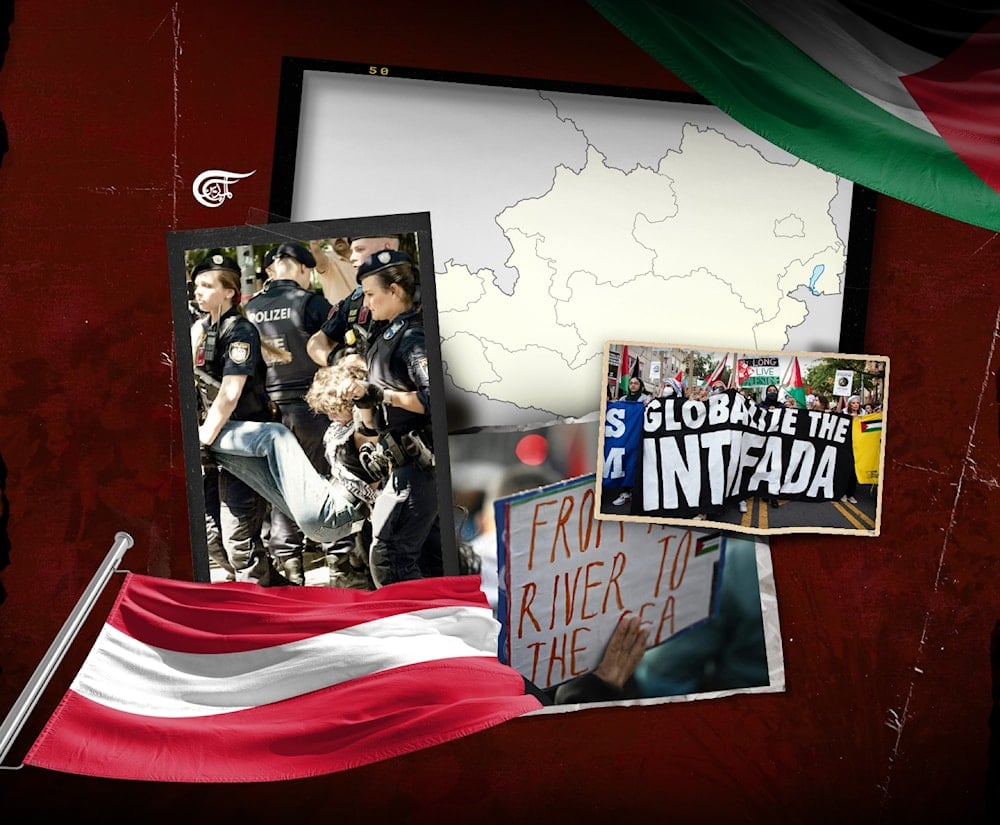How Austria criminalises 'From the River to the Sea' and 'Intifada'
Since October 7, the Austrian authorities have been cracking down on the Palestine solidarity movement in the country. In their repertoire of repressive measures is the criminalisation of the slogan “From the river to the sea, Palestine will be free” and the term “Intifada”. Mobilisations were prohibited, and manifestations were stopped for using either of these. Several activists received fines, and some were even arrested. Dieter Reinisch reports from Vienna.
-

Since May, the police have informed the organisers and participants of each manifestation that the use of “From the river to the sea…” and “Intifada” is forbidden. (Al Mayadeen English; Illustrated by Zeinab El-Hajj)
The march was rather small: A few dozen students assembled for a protest march outside the Technical University of Vienna in Austria on Thursday afternoon—their destination was the Austrian Research Promotion Agency (FFG) office in the 9th district. The students demonstrated against the collaboration between FFG and Israeli research institutions.
A few minutes into the march, police stopped the demonstration. One of the stickers on a loudspeaker read, “From the river to the sea, Palestine will be free.” The police demanded that the sticker be removed; otherwise, they threatened to stop and dissolve the march.
Student Intifada
It was not the first time that this group of pro-Palestinian students had experienced police repression for this and other slogans. In early May, they set up camp at the University of Vienna campus, taking their place in the global “Student Intifada”, which spread from the US to other countries in the Global North.
Viennese students had set up their own camp in solidarity with the worldwide movement and the people in Gaza. Late at night on the third day, police surrounded the encampment and gave the participants ten minutes to leave or face arrests and fines. Asked by Al Mayadeen, the spokesperson for the Austrian police, Mattias Schuster, said the camp had been closed after three days due to regular assessments made by intelligence service personnel who observed and delivered reports: “We noted a gradual radicalisation of the slogans and content of the speeches.” When asked how this “gradual radicalisation” had been expressed, he explained, “Calls in support of Intifada.”
Since then, Austrian police have frequently used the mention of “Intifada” as a pretext to ban or stop manifestations. When lawyer Astrid Wagner spoke at a small rally outside the Interior Ministry a few weeks later, the picket was stopped, and Wagner and two others were fined for “merely quoting from court decisions”, which included slogans and terms like “From the river to the sea…” and “Intifada”, she tells Al Mayadeen.
The aim is to suppress the solidarity movement by any means necessary. Mohammed Abu Rous thinks that the authorities intentionally build a climate in which Jews feel unsafe in Austria, “But there are no attacks on Jews in Vienna. Many Jews attend the pro-Palestinian protests. They are part of our movement”, Abu Rous, a founding member of the Arab Palestine Club (APC), established back in the 1990s, explains. Indeed, Jewish anti-Zionist organisations like “Judeobolschewiener*innen” and “Not In Our Name” are vital parts of the solidarity movement, providing security and speakers at the weekly demonstrations, while also organising direct actions, and actively posting on social media, informing on the crimes committed by "Israel" against the Palestinians.
Activists say that by criminalising the solidarity movement, they try to cover the crimes of the Israeli Apartheid state, which are supported by the current Austrian government: “By so doing, they distract from the main topic that is the Genocide in Gaza.”
From the River to the Sea…
In Vienna, the first manifestations after October 7 were spontaneous, resulting in confrontations with the police and hundreds of fines. They called for an end to the war and Austria’s support for the aggression against Gaza. The demonstrations were held not under the name of the “Arab Palestine Club” or any other organisation but under “Let Gaza Live”, Abu Rous says.
At this time, a pro-Zionist think tank under the name of “Documentation Centre of Political Islam” provided the Interior Ministry, intelligence service, and police with an assessment on the slogan “From the river to the sea, Palestine will be free.” This, initially, internal file – published by the Palestine Solidarity Austria umbrella group in March – had been used to put heavy restrictions on manifestations.
“From the River to the Sea, Palestine will be free” symbolises the Palestinian people’s longing for the liberation of their country. It is an old slogan that has been used even by the Palestine Liberation Organization (PLO) since its invention in the 1960s.
Police demanded that organisers sign a paper beforehand that the slogan would not be used. If it is done regardless, police would stop the manifestation and prohibit follow-up rallies and pickets in support of Gaza – activists refused.
“They want to force you, as organisers, to denounce the central aim of the Palestine liberation movement. And, of course, no one with self-respect would sign this paper. So, we refused to sign this paper, and then the manifestations were prohibited”, Abu Rous says.
However, instead of prohibiting all protests point blank, organisers and police found a compromise: Not signing that they would not use “From the river to the sea…” but signing that they do not “intend to use it”. – “That was the only way that the manifestations were not banned and dissolved”, Abu Rous, who had organised protests in autumn and registered them with the police, remembers.
However, the bigger challenge was the political side: The Interior Minister pressured the executive to prohibit the manifestations, regardless. To achieve this, they portrayed support for Palestine as terror support, “The Austrian executive became an organ of Zionism”, one activist tells Al Mayadeen.
At the start of the most recent solidarity movement in October and November, they charged and fined people for using the slogan. Several court trials followed, trying to convict activists of using the slogan for 'terror support'. Nevertheless, the police actions had no legal basis and were, so far, regularly dismissed by the courts: “We win every single case in court”, Wilhelm Langthaler of Palestine Solidarity Austria tells Al Mayadeen. Police are inventing their own laws, banning manifestations, and fining activists with no legal basis, lawyer Astrid Wagner adds.
Arrest
After Abu Rous refused to sign the paper which demanded the participants of demonstrations not to use the slogan, the political mobilisations were forbidden, “We challenged this prohibition by taking to the streets.” Abu Rous got arrested for holding a sign and a Palestinian flag, “It was an illegal act by the policeman because I was solely arrested for carrying a Palestinian flag on the streets.” The sign read, “Austrian police support Zionism from the Jordan River to the Mediterranean Sea.” He was held for a few hours before being released with fines and charges.
The week after the prohibition of the protest, Abu Rous went alone to the square to protest the arbitrary decision of the police against the solidarity movement, “There was me, a single person, standing behind a wall of policemen”, he remembers. In this way, his organisation wanted to show “how ridiculous the decisions of the Austrian police are.
For these two actions, he received police letters and charges for supporting terrorism. These are merely two of several fines and charges against him.
Intifada
The same dynamics recently occurred surrounding the term “Intifada”. After the student camp protest, the authorities also adopted the interpretation of a Zionist think tank, which had previously consulted the authorities on “From the river to the sea…” and for the term “Intifada”. “What they are saying is that Intifada means ‘Kill the Jews’ and Global Intifada means ‘Kill the Jews everywhere’” Abo Rous said, explaining the distorted interpretation of the term.
Since May, the police have informed the organisers and participants of each manifestation that the use of “From the river to the sea…” and “Intifada” is forbidden, and if anyone uses them, the manifestation will be dissolved.
Intifada means uprising, “standing up against oppression and injustice”, Abu Rous says. Any form of uprising can be called Intifada, he explains, “The uprising against the Nazis in the Warsaw Ghetto was the Warsaw Ghetto Intifada, any workers' struggle, we call Workers' Intifada.”
He continues, “Our actions for Palestine are also for us here in Austria. They are for freedom, democracy, and the right to free expression in this country.” The solicitors of the Palestine solidarity movement filed complaints against the charges, “We will fight it in court.” Abu Rous is still determined to keep the fight for free expression in Austria and against the Genocide in Gaza going.
Two weeks ago, the Union of Palestinian Pharmacists and Medical Doctors went to the Administrative Court, which declared the banning of their demonstration in autumn as unlawful by the police. The union had mobilised for a silent march to mourn and remember the victims of the Israeli aggression in Gaza and the West Bank. The police demanded them to sign the paper not to use “From the river…” but the union organisers refused to sign it, arguing that it was a silent march, and no slogans would be chanted after all. The march was banned, but they won in court six months later. Many think this court decision could be a turning point for the future of the solidarity movement in Austria.
Abu Rous will also challenge the bans and charges in court. Meanwhile, more fines for his activities will be issued. As I leave his apartment on the outskirts of Vienna, the postman delivers another police letter. In May, Abu Rous and his comrades interrupted a talk by conservative and pro-Israeli Foreign Minister Alexander Schallenberg. The police fine reached Abu Rous quicker than usual, “Only 75 Euros this time”, he smiles after opening the letter: “They already give me discounts”, he jokes.

 Dieter Reinisch
Dieter Reinisch
 9 Min Read
9 Min Read











